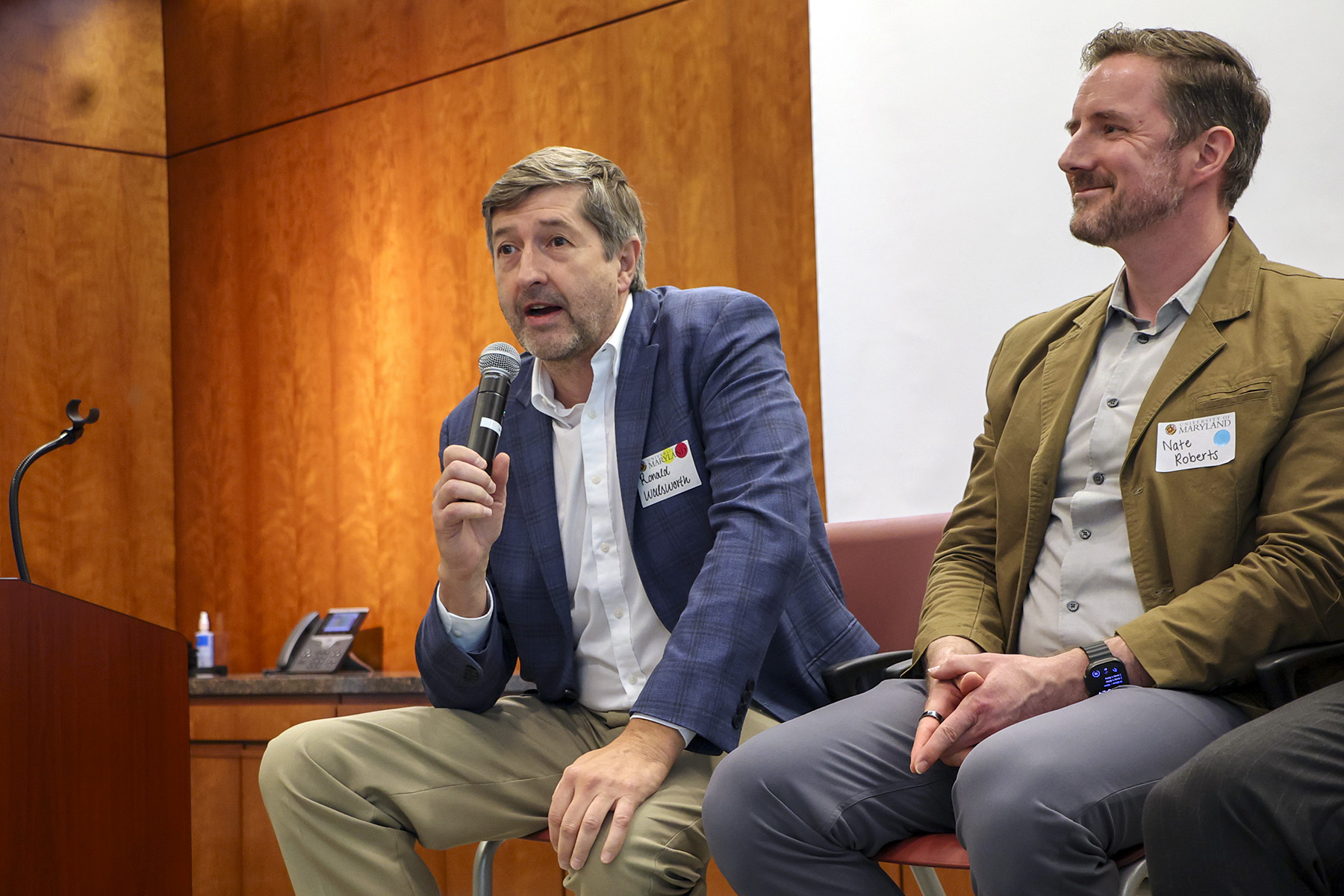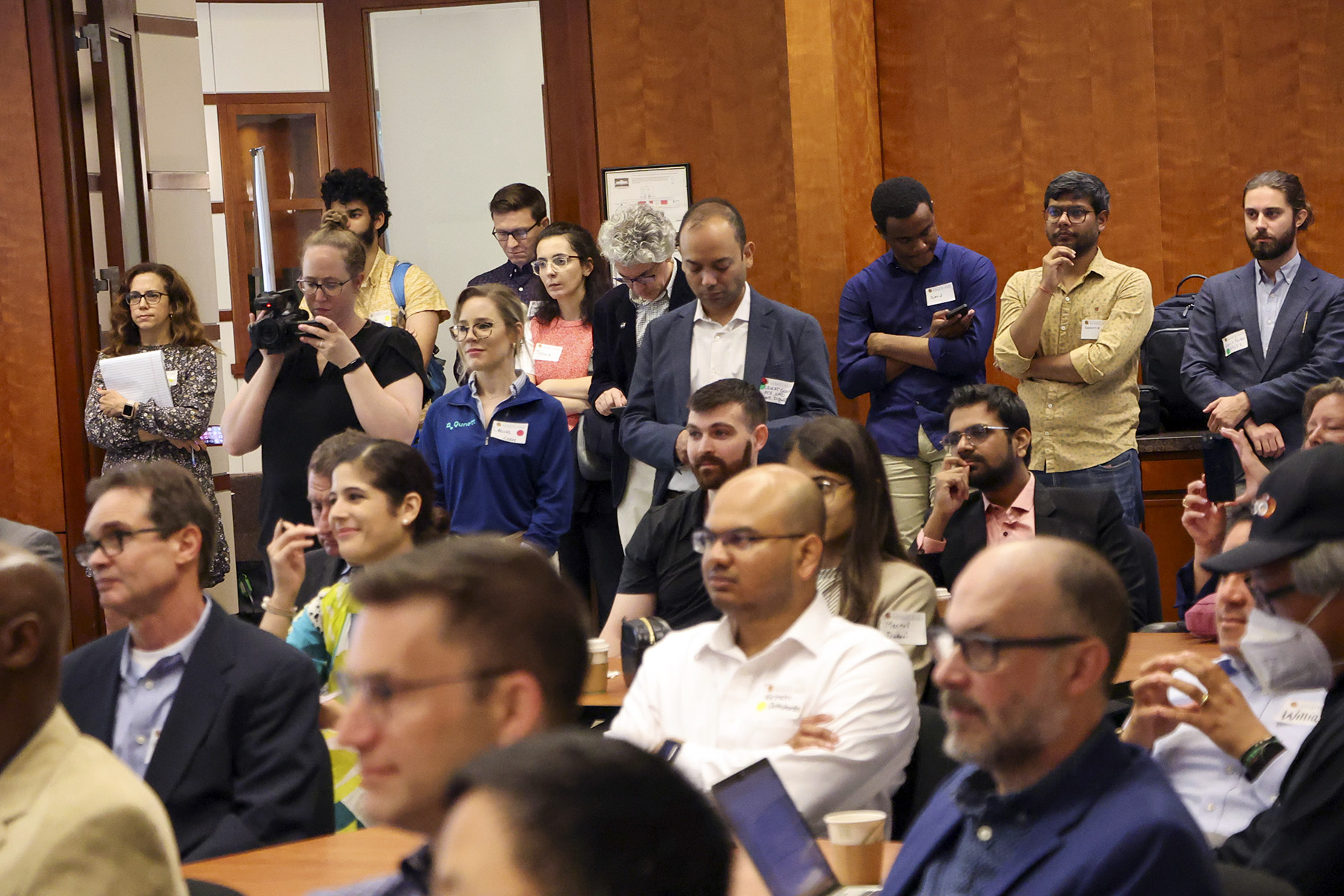Quantum technology startups spurred by university research could revolutionize many industries related to national security, including drug discovery, materials science, finance, AI, and more.
One such startup that sprouted from the University of Maryland is IonQ Inc., a company building quantum computers to solve the world’s most complex problems.
To help create more of those startups and bring their transformative technologies to market, UMD hosted the country’s first I-Corps Quantum for National Security Cohort, giving 17 teams of faculty, students and other researchers the opportunity to explore the commercial potential of their quantum innovations.

“The University of Maryland is home to expansive quantum research and development,” said Dean Chang, UMD’s chief innovation officer and associate vice president for innovation & entrepreneurship and economic development. “With over 200 quantum scientists and engineers spread across world-class research institutes, as well as collaborations with both government and industry, the abundance of technology being developed here is perfect for I-Corps, which helps transform those inventions into products and solutions that benefit society.”
The cohort, based on traditional NSF I-Corps training, guided participants in exploring potential customers for their technologies and developing business models for their startups. Quantum industry-specific guidance was integrated by UMD I-Corps, which hosted the cohort, throughout the three-week initiative.
Participating teams completed an average of 13 customer discovery interviews.
“I-Corps training and customer validation interviews helped our team structure our preparations for our current seed funding round, our pitch decks, revenue models and competitive analysis,” the ArQ Sensors team said in a statement. “Key insights from customers and proxies (e.g., test and evaluation labs, users and buying agents) taught us to be cognizant of pain points and decision-making cycles that create opportunities for new product insertion or outflanking incumbent competitors. One lesson from the training was that even though our core technology is potentially applicable to many different markets and application domains, we must focus narrowly on penetrating beachhead markets first, which requires intensive research diligence, test and validation, and further customization of our prototypes.”
ArQ Sensors is developing rugged, ultracompact and low-power quantum sensors to unlock unseen data from the world’s harshest environments through precision quantum sensing, detecting electromagnetic and environmental signals in extreme conditions such as aviation, space, nuclear power, oil and gas, maritime, underground, and in theaters of military conflict.
The ArQ Sensors team includes Ronald Walsworth, Minta Martin Professor and founding director of the Quantum Technology Center, Amanda Stein, CEO, Quantum Catalyzer, Kristine Ung, graduate research assistant, Joint Quantum Institute, and graduate fellow, Quantum Technology Center, and Seldon Warner, business strategy and development intern, Quantum Catalyzer.
For one team, the I-Corps cohort led to a new partnership.
“The quantum I-Corps experience motivated us to deeply explore potential customer needs and gather valuable insights from a diverse set of stakeholders through 20+ interviews, enabling us to identify broader market opportunities beyond our initial scope,” said Jiashedn Tang, a graduate research assistant in the Institute for Research in Electronics and Applied Physics, Department of Physics, and Quantum Technology Center at UMD. “Encouraged by this expanded market potential and validation, we are excited to pursue the national [NSF] I-Corps Teams program. Additionally, we recently initiated a collaboration with a manufacturer to develop and validate our technology.”
Tang’s team is leveraging quantum strain-sensing technology based on atomic-scale solid-state sensors, enabling in-situ, real-time diagnostics of damage and wear in precision industrial cutting and processing tools.
“This capability could potentially reduce operational uncertainty and enhance reliability in high-value manufacturing processes,” said Tang.
Walsworth and Quantum Technology Center Scientist Daniel Ang were also members of Tang’s I-Corps team.
ZebraKet, another team, found a potential market for its technology, which involves developing solutions for rapid epigenetic sequencing and disease detection using quantum computing and AI.
“One of our key innovations lies in detecting unknown toxins and biohazardous materials when a reference genome is unavailable and DNA fragments are limited,” said Alex Khan, CEO of ZebraKet and a National Quantum Laboratory (QLab) fellow. “We are building a de novo fragment assembly method using quantum computing to enable near-instant sequencing and identification, empowering law enforcement to make critical decisions during accidental exposure, traffic stops, or seizures.”
For Khan, the quantum I-Corps cohort provided insight into the competitive landscape of genomic technologies, particularly the dominance of third-generation sequencing platforms.
“Through customer discovery interviews, we identified a gap in countries still relying on outdated technologies, often yielding inconsistent results,” Khan explained. “These discussions helped us refine our positioning and identify biohazard detection as a viable beachhead market for a quantum-enabled sequencing solution. The experience sparked promising follow-up conversations with stakeholders and clarified the path toward future STTR grants and future partnerships with UMD-IHC, DHS NBACC and UMD CBCB.”
Tailoring I-Corps for quantum research is important for what can be considered nascent technology.
“Quantum is transitioning from theoretical exploration to tangible advancements across many sectors,” said Dan Kunitz, director of the NSF I-Corps Mid-Atlantic Hub and venture strategy and development at UMD. “For quantum startups, the path from lab to market can be especially complex due to deep technical challenges and emerging customer needs. I-Corps provides a critical bridge, equipping researchers and entrepreneurs with the tools, mentorship, and market discovery processes they need to validate applications, refine business models, and accelerate the commercialization of quantum innovations.”
Phaseshift acquired critical business skills during the cohort and learned about the market for quantum technologies.
“I-Corps helped us tremendously. Not only were the instructors very knowledgeable, but they were also extremely helpful in helping us learn more about where our technology fits in the broader market, and what pain points potential customers have,” said Rezlind Bushati, senior advanced scientist at Quantinuum. “Through the help of the mentors, we learned about best practices for approaching potential new customers and points of contact in the industry. This is a crucial skill that extends way beyond I-Corps, and one which we will use throughout our journey in the startup world. Throughout the interview process, we learned quite a bit about what challenges current quantum companies face. It became clear that many problems in the quantum space require solutions that industry simply doesn't have yet. As a result, we learned critical information about the lack of scalable options for quantum companies.”
Phaseshift is developing scalable, foundry-compatible optical metasurfaces for the scaling of next-generation quantum technologies.
The Phaseshift team also includes Amit Agrawal, associate professor, University of Cambridge, and Rohit Shawarikar, business manager for Phaseshift.
The cohort culminated in a Capital of Quantum Startup Symposium, which featured researchers, startup founders, thought leaders and investors in the field of quantum computing.

Maryland Secretary of Commerce Harry Coker, Jr. delivered keynote remarks, highlighting a $40 million investment in the state’s 2026 fiscal year budget aimed at establishing Maryland as the “Capital of Quantum,” including millions in support directed toward UMD’s growing quantum ecosystem.
In addition to Secretary Coker’s remarks, a panel discussion featured Secretary Coker; Walt Gonzales, deputy chief of staff for U.S. Representative Glenn Ivey; Ronald Walsworth; John Beieler, executive director of UMD’s Applied Research Laboratory for Intelligence and Security; Thomas Kramer, chief financial officer of IonQ; and Nate Roberts, vice president of technology at In-Q-Tel.
Panelists explored the national security implications of quantum technologies, the need for cross-sector collaboration, and Maryland’s unique potential to support entrepreneurs through a deep bench of researchers, investors, and innovation infrastructure.
The NSF I-Corps program launched in 2011 to help NSF-funded researchers commercialize their technology, teach scientists and engineers how to validate their business ideas through customer discovery, and apply the Lean Startup methodology, pioneered by Steve Blank, to generate business models for new companies.
Several program expansions later, the NSF I-Corps Mid-Atlantic Hub was launched in 2022 to provide entrepreneurial training to academic researchers in science and engineering in the region.
Spanning 12 large research institutions in North Carolina, Virginia, Maryland, the District of Columbia, and Pennsylvania, the hub has served 1,360 teams through its cohorts. Those teams have gone on to create 402 companies, 1,686 jobs, and raise $446 million in funding.